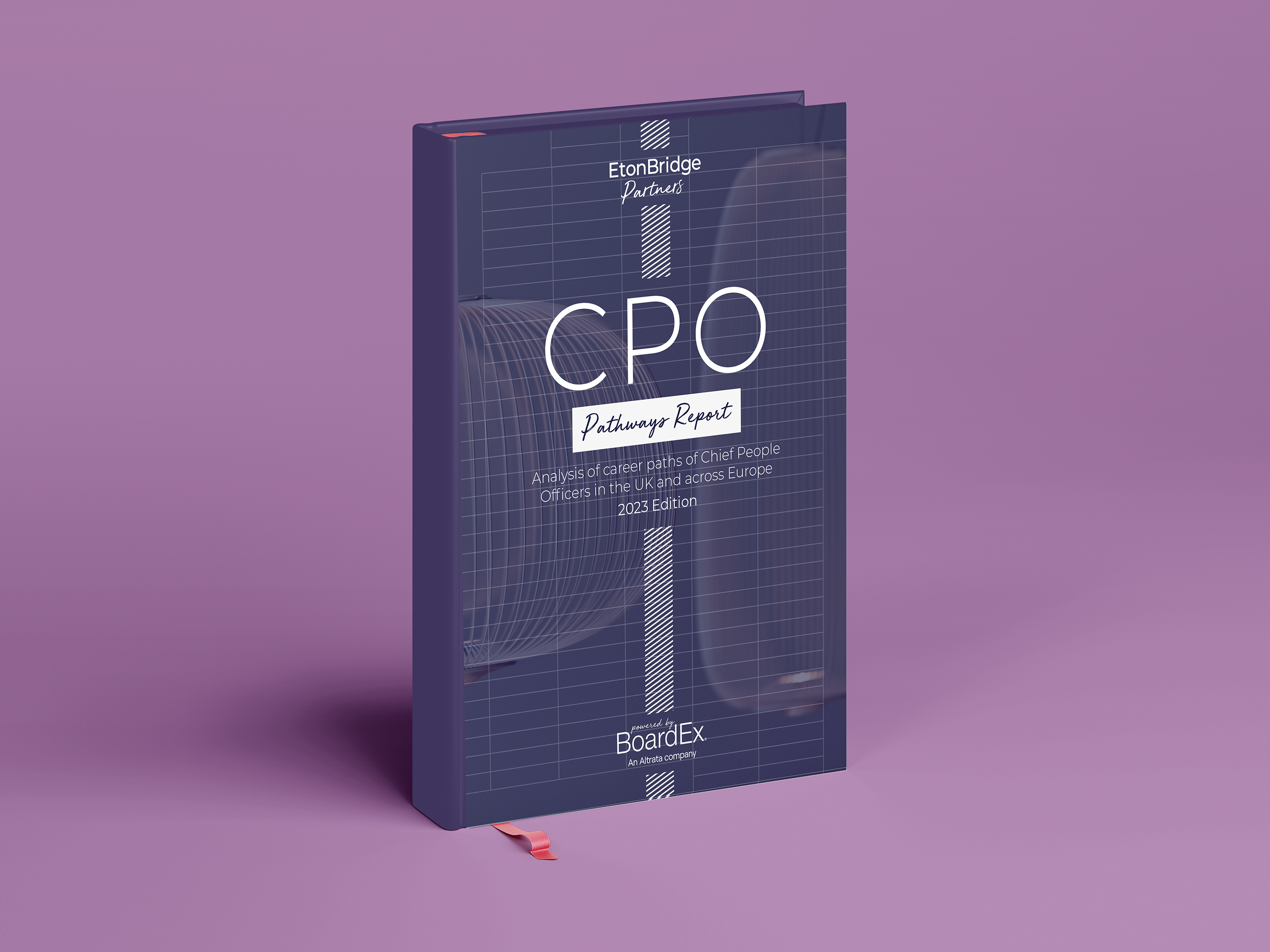The evolving role of a chief people officer
THE ARTICLES ON THESE PAGES ARE PRODUCED BY BUSINESS REPORTER, WHICH TAKES SOLE RESPONSIBILITY FOR THE CONTENTS

Eton Bridge is a Business Reporter client.
The role of chief people officer has intensified significantly over the past two years. Eton Bridge Partners’ Chief People Officer Pathways report shines a light on this role and what it takes to become a Chief People Officer.
The past three years have seen questions posed of human resources like never before. Dramatic global health, economic and political shifts have sent shockwaves through organisations big and small, public and private, and the role of the chief people officer has expanded to consider the human resources implications in their broadest sense.
In 2020, many HR practitioners found themselves working in new ways to answer new questions amid the complexities presented by both Covid-19 and Brexit. And while neither issue could be said to be fully resolved, more recent events in Ukraine, Turkey and Syria as well as closer to home present HR with new challenges on what feels like a daily basis. The meaty problems the function is tackling now in many cases simply didn’t exist two or three years ago, or in the case of the UK industrial relations landscape, were seen to be a thing of the past. At the same time, investor scrutiny of organisations’ ESG agendas increases with each reporting cycle, and the chief people officer role is viewed as becoming more critical to delivery in these areas.

Chief People Officer Pathway Report
Against this backdrop, the focus on the role of the chief people officer has intensified, with a heavy responsibility to lead the organisation’s approach to people risk, reputation and future planning in a highly competitive global talent market.
In our latest report, we look to answer the following questions:
• Where do chief people officers come from, and how should you navigate the sometimes complex route to becoming one?
• Does sector experience really matter?
• Should I hire a chief people officer from the external market, or appoint from within?
• Do gender and/or age play a part?
• How do I get into private equity as a chief people officer?
Many of the findings might, at first glance, be unsurprising: for example, more women than men are appointed to the top HR role. With the gender split across the HR function estimated at roughly 70 per cent female and a push in many boardrooms for more female executive appointments in general, it is hardly a shock that this plays out in HR appointments. However, delve deeper and you’ll find significant differences across Europe and the UK, and once you take age into account, it would appear appointments are heavily affected by a candidate’s age – positively in the case of men, while for women the opposite is true. As part of the research, I asked chief people officers within my network for their response to the insights from the report, their reflections on their own paths to chief people officer, and how they view the role evolving over the short to medium term:
• Prior sector experience seems to be becoming more important, rather than less. Without exception, everyone I spoke to felt HR experience should be the most transferable boardroom skill, and were surprised at this finding, although also agreed that their own experiences of attempting career moves correlated in many circumstances with this data.
• The experience and background of the chief executive officer and the chief finance officer influence the risk appetite when hiring a chief people officer, either out of sector or a first-time chief people officer. Our research shows that chief people officers are much more likely to be hired from out of sector, and perhaps it is this driving the importance of sector knowledge in chief people officer appointments.
• The chief people officer role is evolving to include much, or sometimes all, of the ESG agenda. Many see this broadening of the HR agenda as adding weight to the importance of the role itself, while conversely for others, the inclusion of ESG in the people strategy itself adds board focus to ESG within an organisation, especially for employees themselves. With many investors actively concerned with the sustainability of a business, including long-term talent and workforce planning, some wondered whether chief people officers have realised the power of this wider agenda and embraced the opportunities presented by leading on ESG?
• It might be surprising to some that it is not more common for a reward leader to move into the chief people officer seat. Reward has a unique relationship with the board through remunerations committees (remco), relationships with investors, the company secretary, and corporate finance, compared with its counterparts in HR. We are aware of brilliant chief people officers who have spent time in reward who believe that their background in it set them up for success in the chief people officer role. However, it appears that the limited view from the reward path means that it is unlikely to be a purist reward leader who ultimately moves into a chief people officer seat.
Building the future workforce
What is undeniable is that every business is facing a talent shortage, whether because of a lack of specific skills or simply the right volume of people in the right place at the right cost. Chief people officers I talked to during my research realise that their roles are now becoming those of talent creators, driving longer-term succession planning internally and building programmes to develop especially scarce skills within the existing employee population, rather than buying these skills at a premium on the external market.
Programmes designed to increase socio-economic diversity and opportunity are having an excellent impact, but it was seen as too small scale to really impact the longer-term outcomes for a business. There was broad agreement that the education system in the UK isn’t built to deliver the workforce of the future, and so chief people officers need to be planning for the long term to inform, educate and ultimately attract their future workforce.
Technology – a challenge and an opportunity
Finally, technology in all its forms popped up as part of my qualitative discussions. Whether investing in the technology inside a business, enabling the people function to make informed, insightful decisions, attracting technology talent to an unlikely home, or the implications of leading in a hybrid world where balancing leadership and humanity may be more difficult, all of those I spoke to identified tech as a key challenge for both the role and the wider function, playing directly to the core elements of culture and transformation that should sit at the heart of the chief people officer role.
Personally, I am looking forward to monitoring this data over time and understanding how trends continue and evolve over the next few years. From this data, we can see that there is clearly no single best way to move into a chief people officer role, and I am privileged to help individuals and businesses of all sizes, in the UK and internationally, navigate the evolving world of the people function, sourcing the best talent, with the most relevant experience, to drive organisations forward.
To read the full report, follow this link.
For the purposes of this report, the term chief people officer or chief people officer includes any and all variations of that job title, including but not limited to: chief human resources officer, group HR director, HR director or people director, and is intended to cover all executive leadership positions within the people function.

